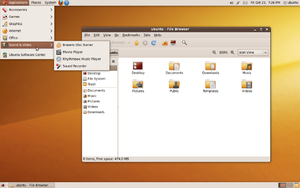Ubuntu (pronounced /ʊˈbʊntu/), is a computer operating system based on the Debian GNU/Linux distribution. It is named after the Southern African ethical ideology Ubuntu ("humanity towards others") and is distributed as free and open source software with additional proprietary software available. Ubuntu provides an up-to-date, stable operating system for the average user, with a strong focus on usability and ease of installation. Web statistics from late 2009 suggest that Ubuntu's share of Linux desktop usage is between 40 and 50%.
Ubuntu is composed of multiple software packages, of which the vast majority are distributed under a free software license (also known as open source). The main license used is the GNU General Public License (GNU GPL) which, along with the GNU Lesser General Public License (GNU LGPL), explicitly declares that users are free to run, copy, distribute, study, change, develop and improve the software. Ubuntu is sponsored by the UK-based company Canonical Ltd., owned by South African entrepreneur Mark Shuttleworth. By keeping Ubuntu free and open source, Canonical is able to utilize the talents of community developers in Ubuntu's constituent components. Instead of selling Ubuntu for profit, Canonical creates revenue by selling technical support and from creating several services tied to Ubuntu.
Canonical endorses and provides support for three additional Ubuntu-derived operating systems: Kubuntu, Edubuntu and Ubuntu Server Edition. There are several other derivative operating systems including local language and hardware-specific versions.
Canonical releases new versions of Ubuntu every six months and supports Ubuntu for eighteen months by providing security fixes, patches to critical bugs and minor updates to programs. LTS (Long Term Support) versions, which are released every two years, are supported for three years on the desktop and five years for servers.The latest version of Ubuntu, 9.10 (Karmic Koala), was released on October 29, 2009.
HISTORY AND DEVELOPMENT PROCESS
Ubuntu is a fork of the Debian project's code base.The original aim was to release a new version of Ubuntu every six months, resulting in a more frequently updated system. Ubuntu's first release was on October 20, 2004.
Ubuntu releases are timed about one month after GNOME releases.In contrast to other forks of Debian, which extensively use proprietary and closed source add-ons, Ubuntu uses primarily free (libre) software, making an exception only for some proprietary hardware drivers.
Ubuntu packages are based on packages from Debian's unstable branch: both distributions use Debian's deb package format and package management tools (APT and Synaptic). Debian and Ubuntu packages are not necessarily binary compatible with each other, however, and sometimes .deb packages may need to be rebuilt from source to be used in Ubuntu. Many Ubuntu developers are also maintainers of key packages within Debian. Ubuntu cooperates with Debian by pushing changes back to Debian,although there has been criticism that this doesn't happen often enough. In the past, Ian Murdock, the founder of Debian, has expressed concern about Ubuntu packages potentially diverging too far from Debian Sarge to remain compatible. Before release, packages are imported from Debian Unstable continuously and merged with Ubuntu-specific modifications. A month before release, imports are frozen, and packagers then work to ensure that the frozen features interoperate well together.
Ubuntu is currently funded by Canonical Ltd. On July 8, 2005, Mark Shuttleworth and Canonical Ltd announced the creation of the Ubuntu Foundation and provided an initial funding of US$10 million. The purpose of the foundation is to ensure the support and development for all future versions of Ubuntu. Mark Shuttleworth describes the foundation as an "emergency fund" (in case Canonical's involvement ends).
Ubuntu 8.04, released on April 24, 2008, is the current Long Term Support (LTS) release. Canonical releases LTS versions every two years, with Ubuntu 10.04 Lucid Lynx (release number subject to change) scheduled as the next LTS version in 2010.The current regular release, Ubuntu 9.10 (Karmic Koala), was released on October 29, 2009.
WHY IS UBUNTU POPULAR?
Ubuntu focuses on usability.The Ubiquity installer allows Ubuntu to be installed to the hard disk from within the Live CD environment, without the need for restarting the computer prior to installation. Ubuntu also emphasizes accessibility and internationalization to reach as many people as possible. Beginning with 5.04, UTF-8 became the default character encoding,which allows for support of a variety of non-Roman scripts. As a security feature, the sudo tool is used to assign temporary privileges for performing administrative tasks, allowing the root account to remain locked, and preventing inexperienced users from inadvertently making catastrophic system changes or opening security holes.PolicyKit is also being widely implemented into the desktop to further harden the system through the principle of least privilege.
Ubuntu comes installed with a wide range of software that includes OpenOffice, Firefox, Empathy (Pidgin in versions before 9.10), Transmission, GIMP (in versions prior to 10.04), and several lightweight games (such as Sudoku and chess). Additional software that is not installed by default can be downloaded using the package manager. Ubuntu allows networking ports to be closed using its firewall, with customized port selection available. End-users can install Gufw and keep it enabled. GNOME (the current default desktop) offers support for more than 46 languages.Ubuntu can also run many programs designed for Microsoft Windows (such as Microsoft Office), through Wine or using a Virtual Machine (such as VMware Workstation or VirtualBox).
VERSION HISTORY
| Version | Code name | Release date |
|---|---|---|
| 4.10 | Warty Warthog | 2004-10-20 |
| 5.04 | Hoary Hedgehog | 2005-04-08 |
| 5.10 | Breezy Badger | 2005-10-13 |
| 6.06 LTS | Dapper Drake | 2006-06-01 |
| 6.10 | Edgy Eft | 2006-10-26 |
| 7.04 | Feisty Fawn | 2007-04-19 |
| 7.10 | Gutsy Gibbon | 2007-10-18 |
| 8.04 LTS | Hardy Heron | 2008-04-24 |
| 8.10 | Intrepid Ibex | 2008-10-30 |
| 9.04 | Jaunty Jackalope | 2009-04-23 |
| 9.10 | Karmic Koala | 2009-10-29 |
| 10.04 LTS | Lucid Lynx | 2010-04-29 |










0 comments:
Post a Comment